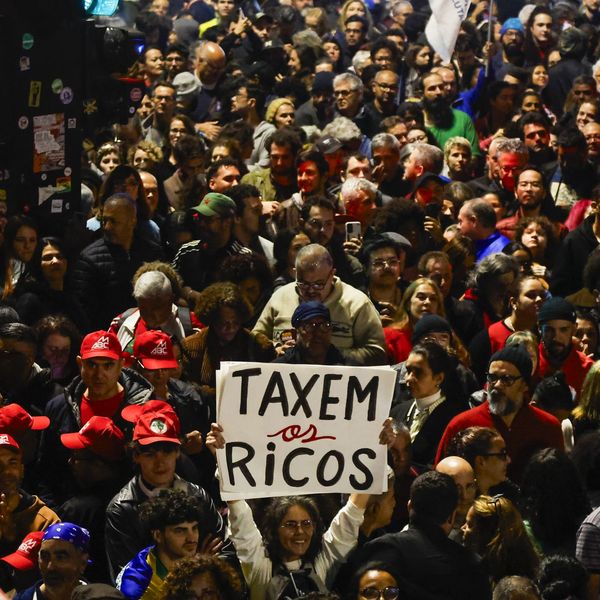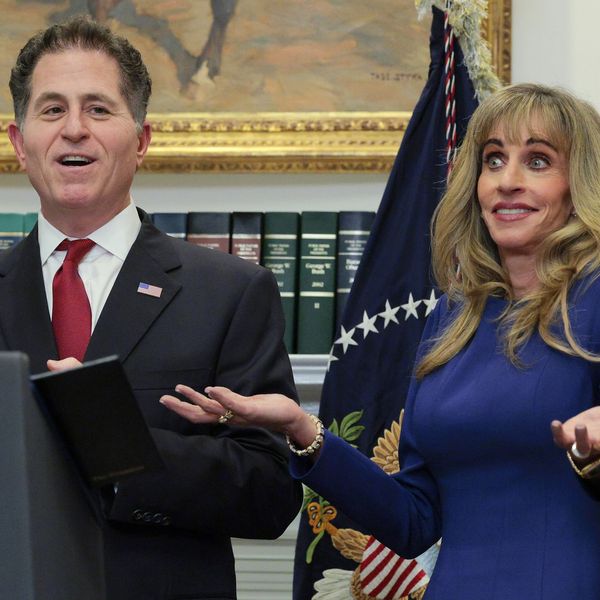
A woman enjoys her choice of Krug or Dom Perignon champagne while relaxing in the first class cabin on a Singapore Airlines Airbus A380 flight. (Photo: s.yume/Flickr/cc)
Over 25 Years, World's Wealthiest 5% Behind Over One-Third of Global Emissions Growth: Study
"We have got to cut over-consumption and the best place to start is over-consumption among the polluting elites who contribute by far more than their share of carbon emissions."
As world leaders prepare for this November's United Nations Climate Conference in Scotland, a new report from the Cambridge Sustainability Commission reveals that the world's wealthiest 5% were responsible for well over a third of all global emissions growth between 1990 and 2015.
"Rich people who fly a lot may think they can offset their emissions by tree-planting schemes or projects to capture carbon from the air. But these schemes are highly contentious and they're not proven over time."
--Peter Newell,
Sussex University
The report (pdf), entitled Changing Our Ways: Behavior Change and the Climate Crisis, found that nearly half the growth in absolute global emissions were cause by the world's richest 10%, with the most affluent 5% alone contributing 37%.
"In the year when the U.K. hosts COP26, and while the government continues to reward some of Britain's biggest polluters through tax credits, the commission report shows why this is precisely the wrong way to meet the U.K.'s climate targets," the report's introduction states.
The authors of the report urge United Kingdom policymakers to focus on this so-called "polluter elite" in an effort to persuade wealthy people to adopt more sustainable behavior, while providing "affordable, available low-carbon alternatives to poorer households."
The report found that the "polluter elite" must make "dramatic" lifestyle changes in order to meet the U.K.'s goal--based on the Paris climate agreement's preferential objective--of limiting global heating to 1.5degC, compared with pre-industrial levels.
In addition to highlighting previous recommendations--including reducing meat consumption, reducing food waste, and switching to electric vehicles and solar power--the report recommends that policymakers take the following steps:
- Implement frequent flyer levies;
- Enact bans on selling and promoting SUVs and other high polluting vehicles;
- Reverse the U.K.'s recent move to cut green grants for homes and electric cars; and
- Build just transitions by supporting electric public transport and community energy schemes.
"We have got to cut over-consumption and the best place to start is over-consumption among the polluting elites who contribute by far more than their share of carbon emissions," Peter Newell, a Sussex University professor and lead author of the report, told the BBC.
\u201cThe wealthiest 5% alone \u2013 the so-called \u201cpolluter elite\u201d - contributed 37% of emissions growth between 1990 and 2015\n\nCambridge Sustainability Commission on Scaling Behaviour Change want to deter frequent flying and SUV purchases\n\nhttps://t.co/2SguMJ3p0b\u201d— Doug Parr (@Doug Parr) 1618297488
"These are people who fly most, drive the biggest cars most, and live in the biggest homes which they can easily afford to heat, so they tend not to worry if they're well insulated or not," said Newell. "They're also the sort of people who could really afford good insulation and solar panels if they wanted to."
Newell said that wealthy people "simply must fly less and drive less. Even if they own an electric SUV, that's still a drain on the energy system and all the emissions created making the vehicle in the first place."
"Promisingly, we have brought about positive change before, and there are at least some positive signs that there is an appetite to do what is necessary to live differently but well on the planet we call home."
--Cambridge Sustainability Commission
"Rich people who fly a lot may think they can offset their emissions by tree-planting schemes or projects to capture carbon from the air," Newell added. "But these schemes are highly contentious and they're not proven over time."
The report concludes that "we are all on a journey and the final destination is as yet unclear. There are many contradictory road maps about where we might want to get to and how, based on different theories of value and premised on diverse values."
"Promisingly, we have brought about positive change before, and there are at least some positive signs that there is an appetite to do what is necessary to live differently but well on the planet we call home," it states.
The new report follows a September 2020 Oxfam International study that revealed the wealthiest 1% of the world's population is responsible for emitting more than twice as much carbon dioxide as the poorest 50% of humanity combined.
An Urgent Message From Our Co-Founder
Dear Common Dreams reader, The U.S. is on a fast track to authoritarianism like nothing I've ever seen. Meanwhile, corporate news outlets are utterly capitulating to Trump, twisting their coverage to avoid drawing his ire while lining up to stuff cash in his pockets. That's why I believe that Common Dreams is doing the best and most consequential reporting that we've ever done. Our small but mighty team is a progressive reporting powerhouse, covering the news every day that the corporate media never will. Our mission has always been simple: To inform. To inspire. And to ignite change for the common good. Now here's the key piece that I want all our readers to understand: None of this would be possible without your financial support. That's not just some fundraising cliche. It's the absolute and literal truth. We don't accept corporate advertising and never will. We don't have a paywall because we don't think people should be blocked from critical news based on their ability to pay. Everything we do is funded by the donations of readers like you. Will you donate now to help power the nonprofit, independent reporting of Common Dreams? Thank you for being a vital member of our community. Together, we can keep independent journalism alive when it’s needed most. - Craig Brown, Co-founder |
As world leaders prepare for this November's United Nations Climate Conference in Scotland, a new report from the Cambridge Sustainability Commission reveals that the world's wealthiest 5% were responsible for well over a third of all global emissions growth between 1990 and 2015.
"Rich people who fly a lot may think they can offset their emissions by tree-planting schemes or projects to capture carbon from the air. But these schemes are highly contentious and they're not proven over time."
--Peter Newell,
Sussex University
The report (pdf), entitled Changing Our Ways: Behavior Change and the Climate Crisis, found that nearly half the growth in absolute global emissions were cause by the world's richest 10%, with the most affluent 5% alone contributing 37%.
"In the year when the U.K. hosts COP26, and while the government continues to reward some of Britain's biggest polluters through tax credits, the commission report shows why this is precisely the wrong way to meet the U.K.'s climate targets," the report's introduction states.
The authors of the report urge United Kingdom policymakers to focus on this so-called "polluter elite" in an effort to persuade wealthy people to adopt more sustainable behavior, while providing "affordable, available low-carbon alternatives to poorer households."
The report found that the "polluter elite" must make "dramatic" lifestyle changes in order to meet the U.K.'s goal--based on the Paris climate agreement's preferential objective--of limiting global heating to 1.5degC, compared with pre-industrial levels.
In addition to highlighting previous recommendations--including reducing meat consumption, reducing food waste, and switching to electric vehicles and solar power--the report recommends that policymakers take the following steps:
- Implement frequent flyer levies;
- Enact bans on selling and promoting SUVs and other high polluting vehicles;
- Reverse the U.K.'s recent move to cut green grants for homes and electric cars; and
- Build just transitions by supporting electric public transport and community energy schemes.
"We have got to cut over-consumption and the best place to start is over-consumption among the polluting elites who contribute by far more than their share of carbon emissions," Peter Newell, a Sussex University professor and lead author of the report, told the BBC.
\u201cThe wealthiest 5% alone \u2013 the so-called \u201cpolluter elite\u201d - contributed 37% of emissions growth between 1990 and 2015\n\nCambridge Sustainability Commission on Scaling Behaviour Change want to deter frequent flying and SUV purchases\n\nhttps://t.co/2SguMJ3p0b\u201d— Doug Parr (@Doug Parr) 1618297488
"These are people who fly most, drive the biggest cars most, and live in the biggest homes which they can easily afford to heat, so they tend not to worry if they're well insulated or not," said Newell. "They're also the sort of people who could really afford good insulation and solar panels if they wanted to."
Newell said that wealthy people "simply must fly less and drive less. Even if they own an electric SUV, that's still a drain on the energy system and all the emissions created making the vehicle in the first place."
"Promisingly, we have brought about positive change before, and there are at least some positive signs that there is an appetite to do what is necessary to live differently but well on the planet we call home."
--Cambridge Sustainability Commission
"Rich people who fly a lot may think they can offset their emissions by tree-planting schemes or projects to capture carbon from the air," Newell added. "But these schemes are highly contentious and they're not proven over time."
The report concludes that "we are all on a journey and the final destination is as yet unclear. There are many contradictory road maps about where we might want to get to and how, based on different theories of value and premised on diverse values."
"Promisingly, we have brought about positive change before, and there are at least some positive signs that there is an appetite to do what is necessary to live differently but well on the planet we call home," it states.
The new report follows a September 2020 Oxfam International study that revealed the wealthiest 1% of the world's population is responsible for emitting more than twice as much carbon dioxide as the poorest 50% of humanity combined.
As world leaders prepare for this November's United Nations Climate Conference in Scotland, a new report from the Cambridge Sustainability Commission reveals that the world's wealthiest 5% were responsible for well over a third of all global emissions growth between 1990 and 2015.
"Rich people who fly a lot may think they can offset their emissions by tree-planting schemes or projects to capture carbon from the air. But these schemes are highly contentious and they're not proven over time."
--Peter Newell,
Sussex University
The report (pdf), entitled Changing Our Ways: Behavior Change and the Climate Crisis, found that nearly half the growth in absolute global emissions were cause by the world's richest 10%, with the most affluent 5% alone contributing 37%.
"In the year when the U.K. hosts COP26, and while the government continues to reward some of Britain's biggest polluters through tax credits, the commission report shows why this is precisely the wrong way to meet the U.K.'s climate targets," the report's introduction states.
The authors of the report urge United Kingdom policymakers to focus on this so-called "polluter elite" in an effort to persuade wealthy people to adopt more sustainable behavior, while providing "affordable, available low-carbon alternatives to poorer households."
The report found that the "polluter elite" must make "dramatic" lifestyle changes in order to meet the U.K.'s goal--based on the Paris climate agreement's preferential objective--of limiting global heating to 1.5degC, compared with pre-industrial levels.
In addition to highlighting previous recommendations--including reducing meat consumption, reducing food waste, and switching to electric vehicles and solar power--the report recommends that policymakers take the following steps:
- Implement frequent flyer levies;
- Enact bans on selling and promoting SUVs and other high polluting vehicles;
- Reverse the U.K.'s recent move to cut green grants for homes and electric cars; and
- Build just transitions by supporting electric public transport and community energy schemes.
"We have got to cut over-consumption and the best place to start is over-consumption among the polluting elites who contribute by far more than their share of carbon emissions," Peter Newell, a Sussex University professor and lead author of the report, told the BBC.
\u201cThe wealthiest 5% alone \u2013 the so-called \u201cpolluter elite\u201d - contributed 37% of emissions growth between 1990 and 2015\n\nCambridge Sustainability Commission on Scaling Behaviour Change want to deter frequent flying and SUV purchases\n\nhttps://t.co/2SguMJ3p0b\u201d— Doug Parr (@Doug Parr) 1618297488
"These are people who fly most, drive the biggest cars most, and live in the biggest homes which they can easily afford to heat, so they tend not to worry if they're well insulated or not," said Newell. "They're also the sort of people who could really afford good insulation and solar panels if they wanted to."
Newell said that wealthy people "simply must fly less and drive less. Even if they own an electric SUV, that's still a drain on the energy system and all the emissions created making the vehicle in the first place."
"Promisingly, we have brought about positive change before, and there are at least some positive signs that there is an appetite to do what is necessary to live differently but well on the planet we call home."
--Cambridge Sustainability Commission
"Rich people who fly a lot may think they can offset their emissions by tree-planting schemes or projects to capture carbon from the air," Newell added. "But these schemes are highly contentious and they're not proven over time."
The report concludes that "we are all on a journey and the final destination is as yet unclear. There are many contradictory road maps about where we might want to get to and how, based on different theories of value and premised on diverse values."
"Promisingly, we have brought about positive change before, and there are at least some positive signs that there is an appetite to do what is necessary to live differently but well on the planet we call home," it states.
The new report follows a September 2020 Oxfam International study that revealed the wealthiest 1% of the world's population is responsible for emitting more than twice as much carbon dioxide as the poorest 50% of humanity combined.

